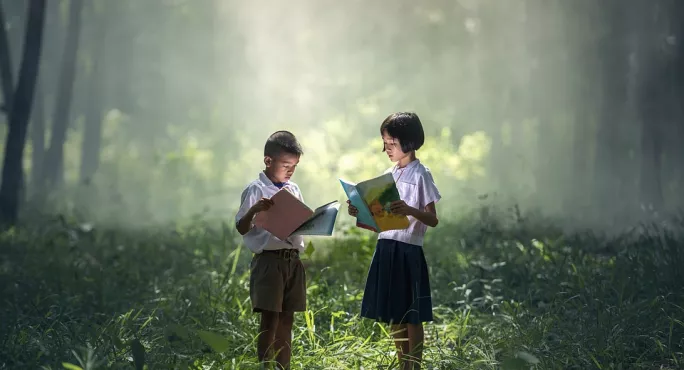- Home
- ‘A knowledge-rich curriculum helps poor students’
‘A knowledge-rich curriculum helps poor students’

I wrote to Philip Pullman once, a long time ago. It was only through his wondrous, tear-jerking, epic, steampunk-fantasy children’s books that I discovered Milton and Blake.
Such names certainly hadn’t been resident on my bookshelves at home and they weren’t part of my school’s haphazard English curriculum in the 1990s. I think I was seeking my new-found literary hero’s opinion on something in my letter, but all I really remember is that in his reply he particularly thanked me for including a self-addressed envelope.
That epitomised Pullman for me: a gentle, modest manner underplaying an intimidating intellect.
I recently read his anthology of essays, Daemon Voices, and had been planning to write something for Tes about its tremendous value to an English teacher, an education blogger, and, as I style myself every summer holiday, an undiscovered novelist.
Fetishising 'facts, facts, facts'
Then about a month ago I saw that he was briefing the press that the English education system was fetishising “facts, facts, facts” and that this was a “recipe for the destruction of the soul”. It’s a criticism that keeps appearing, but it’s doubly wrong.
It’s wrong because there is more creativity in education than ever before. It’s also wrong as a criticism because knowledge is not an inconvenience devised by pedants, but rather a great leveller that facilitates social mobility and equality.
I’ll be honest. I chose English as an A level, a degree, a postgrad dalliance and as a career precisely because it involves the least possible knowledge. I actually got better grades in history and French at school, with the help of two excellent and extremely patient teachers, but that took much more effort and hard work so I chose to continue with the subject in which I had an innate, effortless, passable mediocrity. I’ve dabbled with teaching the knowledge-rich subjects law and politics and, ye gods, how is anyone meant to remember all that stuff?
'Our democracy will weaken and break'
In truth, I’m relying on someone else to remember it and to do a good job of teaching it. Because if our future judges divorce their evaluative skills from knowledge of precedent then we will be left at the mercy of whim and arrogance.
If our future politicians have no reverence for the constitutional systems and traditions that have evolved over hundreds of years, our democracy will weaken and break.
In Pullman’s trilogy of novels, His Dark Materials, the protagonist Lyra relies on her childish unconscious grace to read a powerful truth-telling device: the alethiometer. She’s “gifted and talented” in the horrible terminology of the 2000s that dismissed encouraging effort, practice and progress in favour of simply identifying divine providence.
Pullman is well aware of the concept. One of the essays in Daemon Voices is about his admiration for an 1810 essay, "On the Marionette Theatre" by Heinrich von Kleist, whcih explored the unconscious grace we lose in adolescence, drawing an analogy with being cast out of Eden after taking from the Tree of Knowledge. “If we want the wisdom that comes with experience,” writes Pullman, “we have to leave the innocence behind.”
GCSEs and A levels are 'damaging'
Privileged students have a head start on the wisdom. They grow up with a bookshelf where Milton and Blake sit patiently waiting. They eat up facts at the dinner table and bathe in culture on family holidays.
It’s disadvantaged students who are further disenfranchised by the patronising attitude that knowledge isn’t for them and that it’s adorable for them to remain unquestioning innocents who dutifully doff their cap to his lordship or ladyship.
Philip Pullman doesn’t really believe in the silly nostalgia for Edenic innocence he’s selling with his claims that exam qualifications such as GCSEs and A levels are “damaging” and “destructive”.
He would urge Eve to take from the Tree of Knowledge and sit the damn test, and he did so through his portrayal of Lyra. What’s really happening here is that Pullman, along with a number of other children’s writers, and a disappointing handful of teachers, find it easier to believe in the potential of the magnificent but fictional Lyra, or her equally inspiring-but-fictional companion Will, than in the real, flesh-and-blood, sometimes challenging young people sitting expectantly in classrooms every day.
'We owe it to our students'
At the end of His Dark Materials, Lyra loses her innate ability to read the alethiometer and sets out on the long, tough, lifelong process of learning to read it with an adult’s eyes.
In Pullman’s words, “There is a great deal of work, and not a little suffering, and many setbacks before she will reach that goal; but there is a goal and it can be reached.” The “suffering” and “setbacks” are necessary for deep and meaningful learning and progress, and are far from “damaging” or “destructive”.
We owe it to our students, especially those from disadvantaged backgrounds, to raise our expectations and not flinch from providing a foundation of knowledge that will make the skills we equip them with meaningful. To quote someone who remains a hero of mine: “It’s the hope of every human life, in fact; the hope that we can learn something true, and pass it on.”
Andrew Otty leads 16-19 English in an FE college. He is an ambassador for education charity SHINE
Keep reading for just £1 per month
You've reached your limit of free articles this month. Subscribe for £1 per month for three months and get:
- Unlimited access to all Tes magazine content
- Exclusive subscriber-only stories
- Award-winning email newsletters



